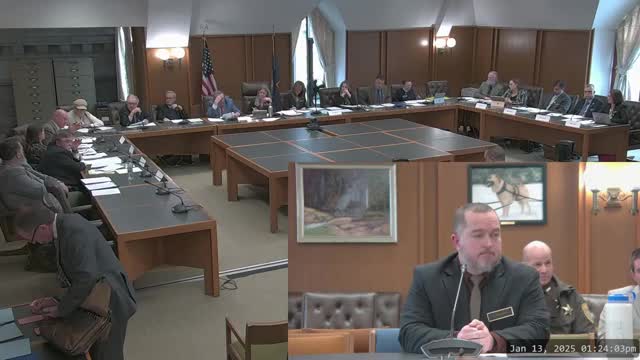Counties seek authority for revolving funds to cover paid law‑enforcement details; sheriffs cite operational need
Get AI-powered insights, summaries, and transcripts
Subscribe
Summary
Sponsor and sheriff’s representatives said county revolving funds would let departments accept outside paid details without mid‑year supplemental appropriations; committee members asked about governance, transfers and oversight.
House Bill 110, with an amendment circulated Jan. 13, would authorize counties to establish revolving expense accounts for charges tied to special details—private paid law‑enforcement services—and to retain revenue from those services to replenish the fund.
Representative Douglas Trotter, sponsor, said the change would mirror existing municipal and state practices and give counties the option to seed a revolving fund (for example, $20,000) that pays deputies working private details; payments by private entities would replenish the fund and any excess would flow to the general fund. He said the authority is optional; counties would decide whether to adopt a revolving fund and the initial appropriation amount during their budget process.
Jim McIntyre, chief deputy of the Belknap County Sheriff’s Department, and other sheriffs’ representatives told the committee counties currently set outside‑detail line items by best‑estimate; if the line is overspent, departments must seek transfers or supplemental appropriations. They said demand for details (for construction escorts, special events and other escorted movements) has increased as local and state agencies face manpower shortages and that a revolving fund would reduce delays and administrative steps when counties provide such services.
Committee members questioned governance: who authorizes expenditures from the fund, whether funds could be transferred to other county budget lines, and which county body (commissioners or delegation) approves establishment and initial deposits. Representative Kristi Coley and others asked whether counties might use revolving funds to mask general operating costs or move money between budgets. Sponsor and witnesses said commissioners and delegations would approve initial appropriations and that payroll/HR processes would still document pay for deputies working details; revenues above the operating floor would be returned to the general fund.
Witnesses urged the committee to allow counties the same fiscal tool municipalities already use; the committee closed the hearing with follow‑up questions about statutory detail and clarity of oversight.
